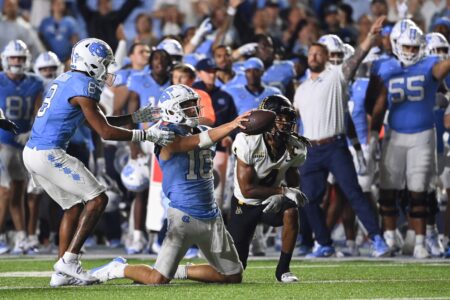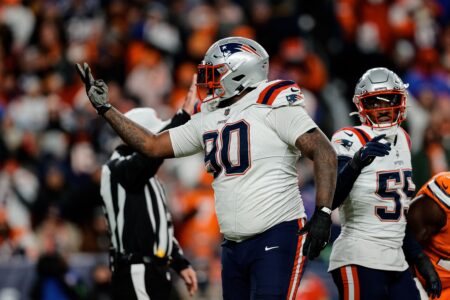lamafist
Rotational Player and Threatening Starter's Job
- Joined
- Jul 26, 2008
- Messages
- 1,197
- Reaction score
- 124
Since the advent of the salary cap era, the NFL draft has been at best redundant and, presently, actually counterproductive as a tool to help instill competitive balance among the teams in the NFL.
When teams had no spending limit, the league needed the draft to prevent successful teams from going out and buying all of the best players coming out of college. The salary cap was (putatively) installed to serve the same purpose for free agents, and would not only continue to function in that regard, but would actually function BETTER if you treated all players coming out of college as UFAs. I say better, because at this point, the escalation of the 1st round rookie contract structure: a) ensures that the early picks will be grossly over-payed at the expense of the middle-round guys and the veterans., and b) punishes the teams the draft is supposed to help by forcing them to wager way too much money on their picks working out.
When the conventional wisdom says nobody ever wants the #1 pick, you know the system is broken. Many suggest tinkering with the rookie pay scale, but that's going to be a non-starter with the NFLPA and the agents for a host of reasons. It also would result in dramatic increase in
general animosity between the young players and their franchises, and lead to even more nasty contract disputes, holdouts, and all the general ugliness that makes rooting for your team less fun.
No, the only solution that makes sense is to entirely abolish the draft. You can keep the combine, Mel Kiper, and all of the over-analysis if you want, only replace the actual draft days with a "rookie signing convention." Teams can talk all they want with the rookie free agents before then, but no arrangements can be binding until noon on Day 1 of the signing convention. There's no limit or floor on the contracts offered, no artificial restrictions on contract structure or length, and teams are free to sign as many or as few players for as much or as little money as they want.
Here's a list of problems this will solve:
* Teams like the Lions, who would be better suited in their rebuilding effort by acquiring a bunch of mid-priced guys instead of paying one college star a ridiculous amount of money, would be able to do so.
* You no longer have to worry about having the most promising college players' careers ruined by ending up stuck with lousy franchises.
* With players no longer being forced to negotiate with just one franchise, there's no need for the protective limits on contract structure that the agents can then turn to their advantage, at the expense of the functionality of the system.
* Consequently, rookie salaries will no longer vary independently of the overall quality of the draft pool.
* A rookies' first experience in the league isn't being jerked around, told where you're going to play, for whom, and for approximately how much, and how long before you can go somewhere else. Do not underestimate the long-term benefits of this. The draft is THE reason that so many players end up with a huge chip on their shoulders after a few years in the NFL.
* If you fell in the draft because of an injury or rumors about your character, too bad -- you're making 4th round pick money for the first 4-5 years of your career. Without a draft, if you think your value is artificially low coming out of school, find someone willing to offer you a 1 year "prove it" deal with a big roser-bonus in year $2, if the team wants to keep you.
* Employees like to be treated like valued assets, not prizes or cattle. Players will behave much, much better in bad situations that they chose themselves of their own free will than they will in situations in which they were told to pack their bags and move to Buffalo. Graduates of med, law, and business school often have to move to undesirable places to get the job they want, but they stick it out because they made that choice.
* Veteran players will be happy, as they'll likely get a bigger piece of the pie when teams aren't forced to keep a rookie pool. Meanwhile, most of the rookies will be getting a bigger piece of the pie, too -- the only ones who will be unhappy are the would-be-early-1st-rounders, whose price tags have been artificially inflated.
* Without the draft-induced chip on their players' shoulders, teams will find it easier to resign their players. This will do more to defray the losses a team suffers in free agency than the Franchise Tag, which was a huge miscalculation, and has caused way more problems than its fixed.
* If a player wants to play where he grew up or went to college, he can make it happen by offering a hometown discount. Having more players playing in places they have pre-existing fanbases and support structures can only be a good thing.
Seriously, I could go on all day. I mean, I know that at this point in history, many of us are less than convinced of the sustaining power of free-market forces, but in a controlled system like the NFL creates with its salary cap, it really should work as well in practice as it does in theory. It would be a win-win-win situation for the owners, players, and fans.
Too bad it'll never, ever happen. There's no way any commissioner would go far enough out on a limb to actually see it through.
When teams had no spending limit, the league needed the draft to prevent successful teams from going out and buying all of the best players coming out of college. The salary cap was (putatively) installed to serve the same purpose for free agents, and would not only continue to function in that regard, but would actually function BETTER if you treated all players coming out of college as UFAs. I say better, because at this point, the escalation of the 1st round rookie contract structure: a) ensures that the early picks will be grossly over-payed at the expense of the middle-round guys and the veterans., and b) punishes the teams the draft is supposed to help by forcing them to wager way too much money on their picks working out.
When the conventional wisdom says nobody ever wants the #1 pick, you know the system is broken. Many suggest tinkering with the rookie pay scale, but that's going to be a non-starter with the NFLPA and the agents for a host of reasons. It also would result in dramatic increase in
general animosity between the young players and their franchises, and lead to even more nasty contract disputes, holdouts, and all the general ugliness that makes rooting for your team less fun.
No, the only solution that makes sense is to entirely abolish the draft. You can keep the combine, Mel Kiper, and all of the over-analysis if you want, only replace the actual draft days with a "rookie signing convention." Teams can talk all they want with the rookie free agents before then, but no arrangements can be binding until noon on Day 1 of the signing convention. There's no limit or floor on the contracts offered, no artificial restrictions on contract structure or length, and teams are free to sign as many or as few players for as much or as little money as they want.
Here's a list of problems this will solve:
* Teams like the Lions, who would be better suited in their rebuilding effort by acquiring a bunch of mid-priced guys instead of paying one college star a ridiculous amount of money, would be able to do so.
* You no longer have to worry about having the most promising college players' careers ruined by ending up stuck with lousy franchises.
* With players no longer being forced to negotiate with just one franchise, there's no need for the protective limits on contract structure that the agents can then turn to their advantage, at the expense of the functionality of the system.
* Consequently, rookie salaries will no longer vary independently of the overall quality of the draft pool.
* A rookies' first experience in the league isn't being jerked around, told where you're going to play, for whom, and for approximately how much, and how long before you can go somewhere else. Do not underestimate the long-term benefits of this. The draft is THE reason that so many players end up with a huge chip on their shoulders after a few years in the NFL.
* If you fell in the draft because of an injury or rumors about your character, too bad -- you're making 4th round pick money for the first 4-5 years of your career. Without a draft, if you think your value is artificially low coming out of school, find someone willing to offer you a 1 year "prove it" deal with a big roser-bonus in year $2, if the team wants to keep you.
* Employees like to be treated like valued assets, not prizes or cattle. Players will behave much, much better in bad situations that they chose themselves of their own free will than they will in situations in which they were told to pack their bags and move to Buffalo. Graduates of med, law, and business school often have to move to undesirable places to get the job they want, but they stick it out because they made that choice.
* Veteran players will be happy, as they'll likely get a bigger piece of the pie when teams aren't forced to keep a rookie pool. Meanwhile, most of the rookies will be getting a bigger piece of the pie, too -- the only ones who will be unhappy are the would-be-early-1st-rounders, whose price tags have been artificially inflated.
* Without the draft-induced chip on their players' shoulders, teams will find it easier to resign their players. This will do more to defray the losses a team suffers in free agency than the Franchise Tag, which was a huge miscalculation, and has caused way more problems than its fixed.
* If a player wants to play where he grew up or went to college, he can make it happen by offering a hometown discount. Having more players playing in places they have pre-existing fanbases and support structures can only be a good thing.
Seriously, I could go on all day. I mean, I know that at this point in history, many of us are less than convinced of the sustaining power of free-market forces, but in a controlled system like the NFL creates with its salary cap, it really should work as well in practice as it does in theory. It would be a win-win-win situation for the owners, players, and fans.
Too bad it'll never, ever happen. There's no way any commissioner would go far enough out on a limb to actually see it through.

















